Best acoustic guitar pickups: electrify your acoustic with our expert picks
Whether it be for performing live or recording at home, the best acoustic guitar pickups from LR Baggs, Fishman and others will help you enhance your tone
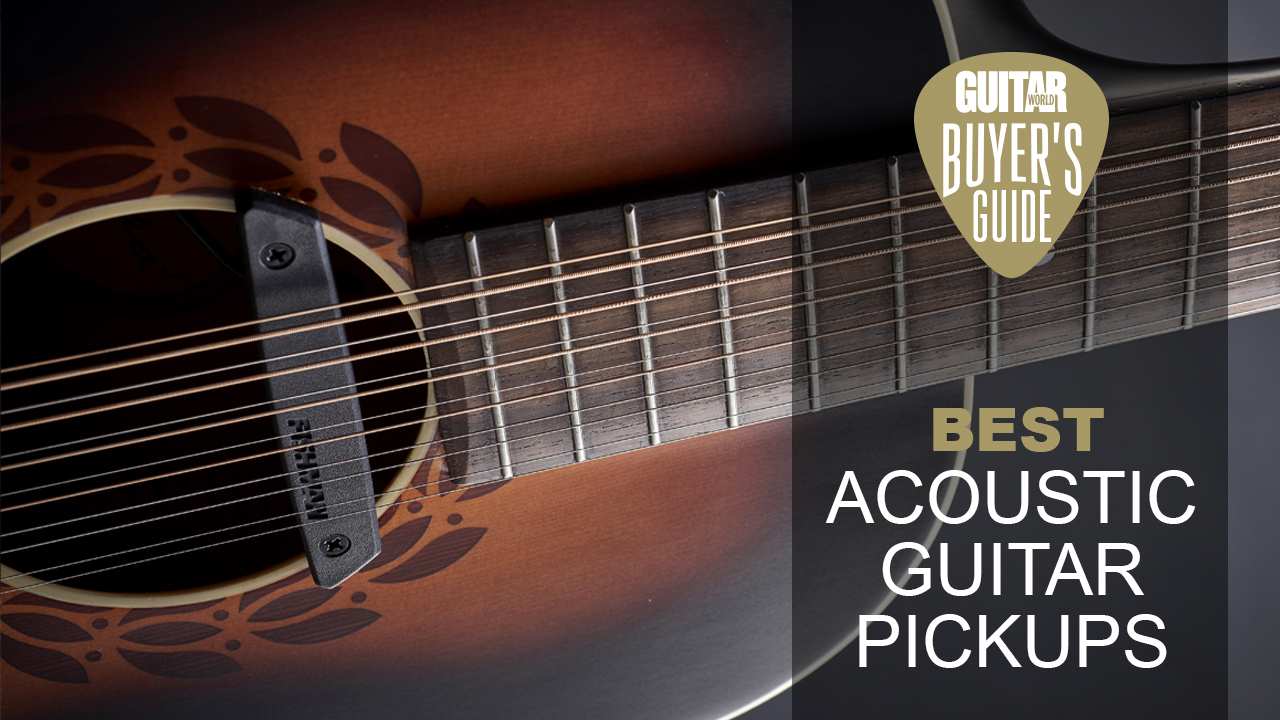
All the latest guitar news, interviews, lessons, reviews, deals and more, direct to your inbox!
You are now subscribed
Your newsletter sign-up was successful
Many are put off the sound of an amplified acoustic for one reason; the stock pickups often aren’t up to scratch. There’s nothing worse than plugging in your resonant acoustic and hearing it plummet into a shrill and unpleasing mess because of the pickup. However, adding one of the best acoustic guitar pickups to your instrument can take a dull-sounding piezo pickup to new levels, or add another layer of tonality to your latest recording.
Although adding an acoustic pickup takes some installation, most are more straightforward than you think. Plus, the upside of significantly improving the plugged-in sound of your acoustic guitar makes the slight inconvenience of installation a no-brainer. Especially if you’re a guitarist looking to upgrade your instrument without buying an entirely new one.
There are multiple reasons you may want to add an acoustic pickup to your guitar; most obviously, your acoustic may not have one already installed. You might also want a more unconventional pickup to experiment with a completely different tone, or perhaps you hate recording acoustic guitar with a microphone and would prefer to record at instrument level.
Whatever your reasons, there’s an acoustic guitar pickup out there for you. Here, we’ve brought you the 11 best acoustic guitar pickups, spanning a variety of budgets. If you want to learn more about acoustic guitar pickups, check out our FAQs section. To see the best options available today, keep scrolling for our top picks.
Our top picks
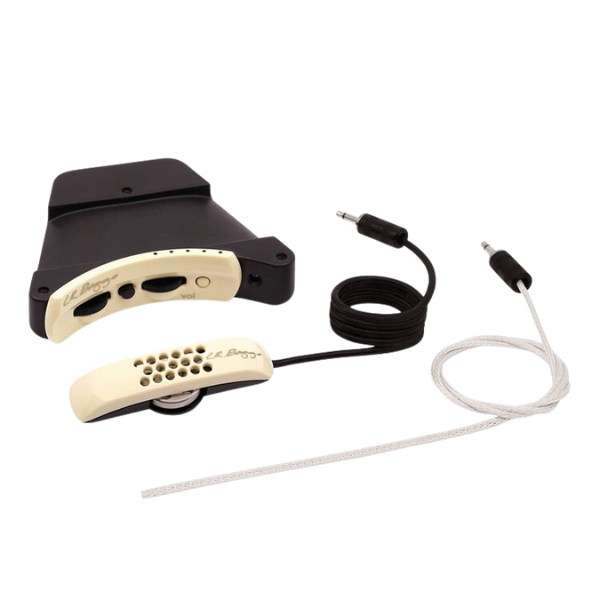
Delivering superb sound with excellent noise and feedback rejection, the LR Baggs Anthem is an industry-standard acoustic guitar pickup. The combo of a condenser and piezo mic makes this a powerful system that delivers incredible sound.
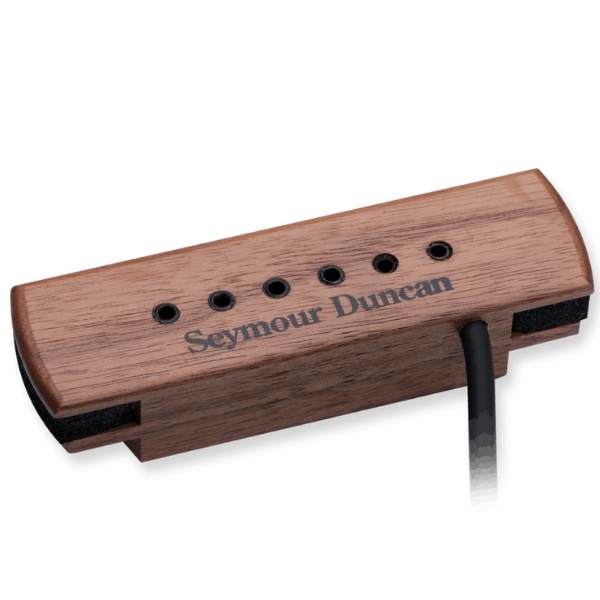
The Seymour Duncan Woody is popular thanks to its easy installation and removal process. It's very reasonably priced and gives you an excellent plugged-in tone for your acoustic guitar, delivering noise-free performance.
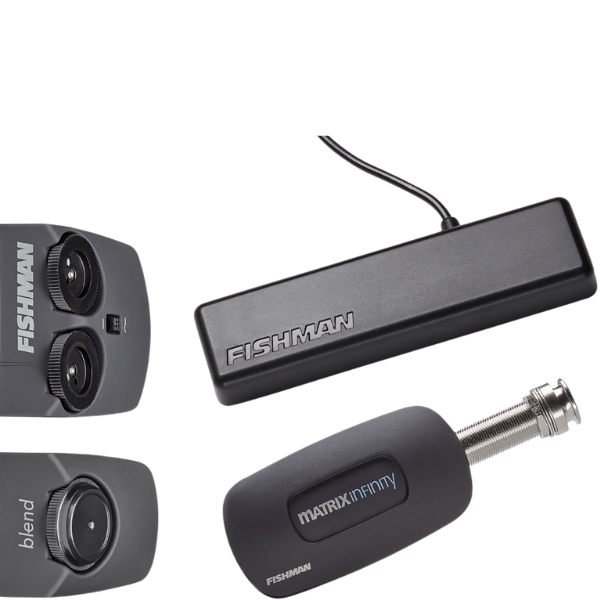
If you like to add percussive elements to your acoustic guitar playing but need a little more punch, we'd go for the Fishman PowerTap Infinity. The addition of a body sensor makes it great for players who like to tap or strike the body of their acoustic.
Best overall
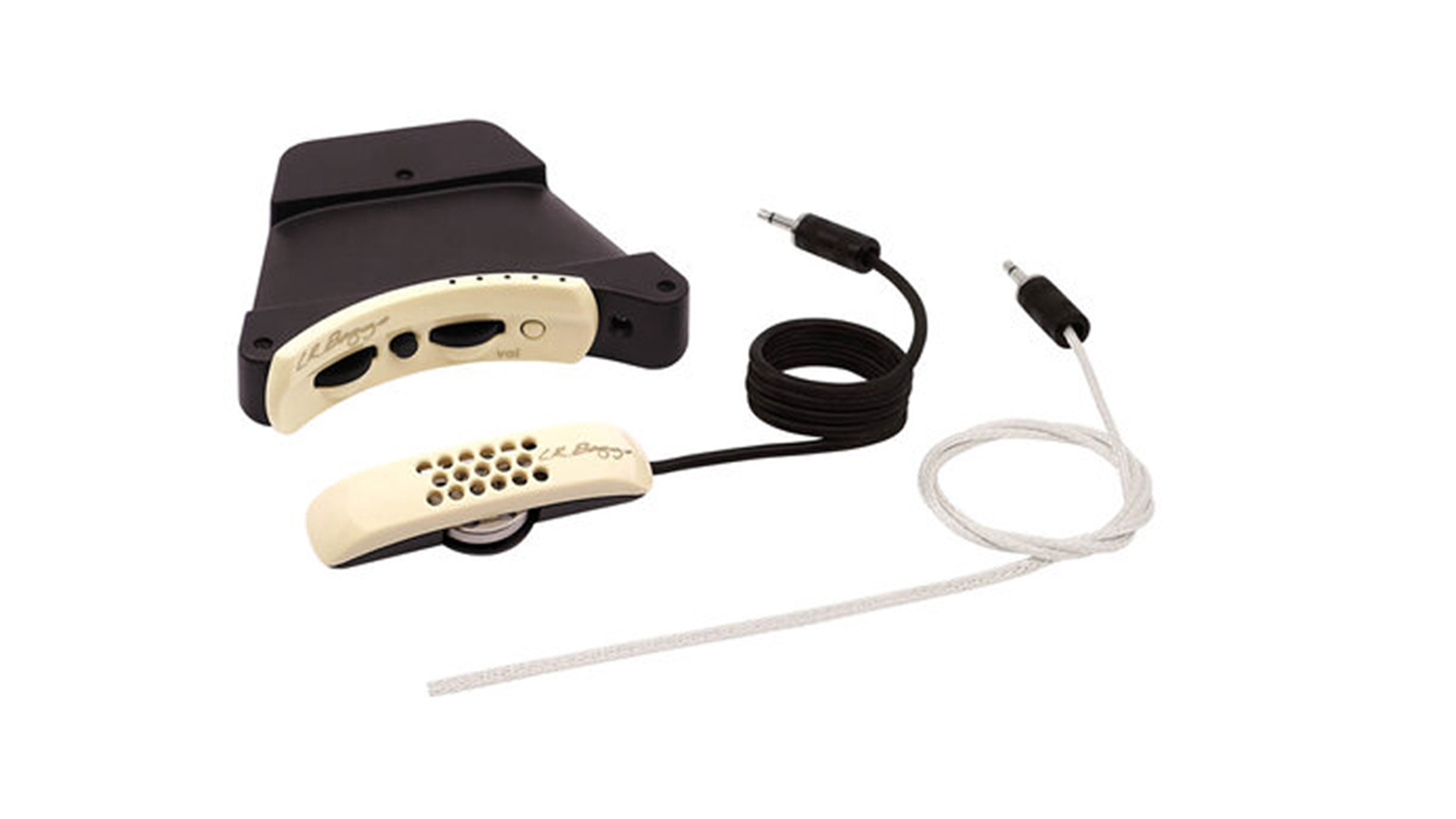
1. LR Baggs Anthem Acoustic Guitar Pickup
Our expert review:
Specifications
Reasons to buy
Reasons to avoid
Once again, when it comes to the best acoustic guitar pickups it’s nigh-on impossible to see past LR Baggs Anthem pickup and microphone setup. It is used by the likes of Jake Bugg and Marcus King, and perhaps should be considered the industry standard. It’s not cheap, but nor is it prohibitively expensive, and if you are serious about your tone and need a pickup option for the stage or studio, this is it.
There is none of that thwacky artificiality that you sometimes get with acoustic pickups. No feedback. The Anthem system positions a piezo-style Element pickup under the saddle and combines it with a condenser mic that’s mounted 3mm from the underside of the bridge plate. The mic performs just as a studio mic would. It is noise-canceling and has a flatter frequency response that is responsive to your instrument.
The soundhole preamp is discretely mounted and gives you control over volume, phase inversion, mic trim and mix, the latter letting you dial in the right amount of low-end from the element pickup. There is also a battery check feature, too, so you know you’ve got enough juice to get through a show.
Best budget
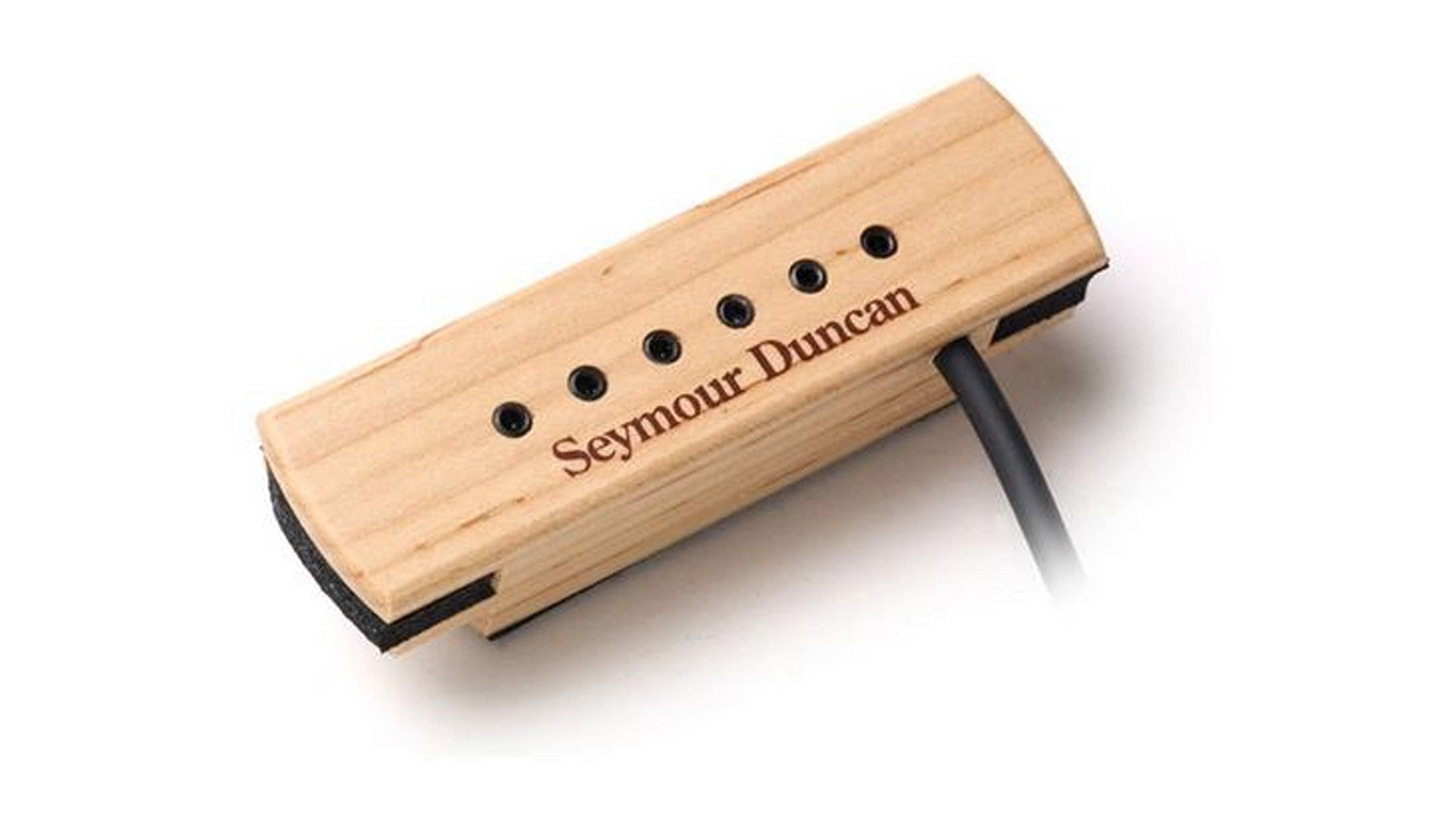
2. Seymour Duncan Woody SA-3XL
Our expert review:
Specifications
Reasons to buy
Reasons to avoid
As a fuss-free, wallet-friendly option, this hum-canceling option from the Californian pickup titans is hard to beat. For a start, it's easy to install and similarly easy to remove. Those looking for the occasional electro-acoustic solution for gigging will find a lot to like in the Woody. It looks good, too, with natural finish options including actual real maple and walnut that should complement a wide range of acoustics.
The Woody is non-intrusive and fits any acoustic with a soundhole radius between 3.85” and 4.1”. The pole pieces are adjustable, so you can fine-tune output for each string. And best of all, this Woody is humbucking; sometimes the last thing you want when playing a delicate fingerstyle passage is 60-cycle mains hum in the background.
Of course, if you’re on an even-tighter budget and need it for amped-strumming at the odd gig where a little hum is not too big a deal, you could save 20 bucks and go for the single coil Woody. This could make it the best acoustic guitar pickup for beginners – also check our guide to the best acoustic guitars for beginners.
Best percussive
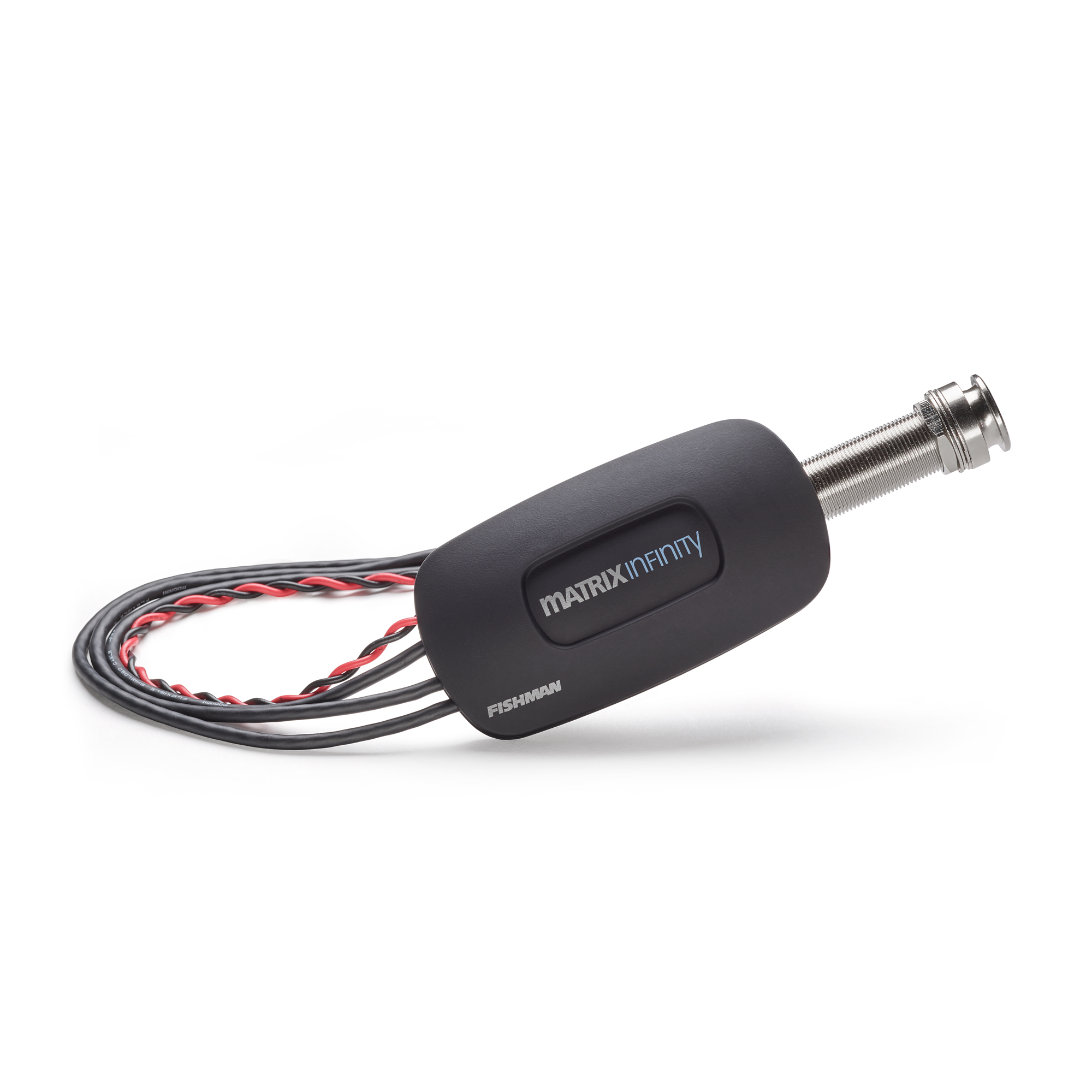
2. Fishman PowerTap Infinity Acoustic Pickup
Our expert review:
Specifications
Reasons to buy
Reasons to avoid
Fishman’s flagship acoustic pickup system has been upgraded with a Tap body sensor complementing the Matrix under-saddle pickup to help capture every nuance from your playing. This is the best acoustic guitar pickup for guitarists who play percussively – you'll love its feedback-free performance and transparency.
Elsewhere, we’ve got the redesigned soundhole-mounted controller as seen on the excellent Matrix Infinity VT outfit. The Unique Tone control enables you to cut mids and boost lows and highs for quick scooped tones. The repositioned voicing switch allows you to match the pickup’s performance to the guitar, the amp or indeed the occasion. There are options for narrow, wide and split saddles and the pickup/preamp serves steel or nylon strings equally.
As ever, installation is not for the inexperienced, so we would co-sign Fishman’s advice to get a professional in to do the job.
Best noise-canceling
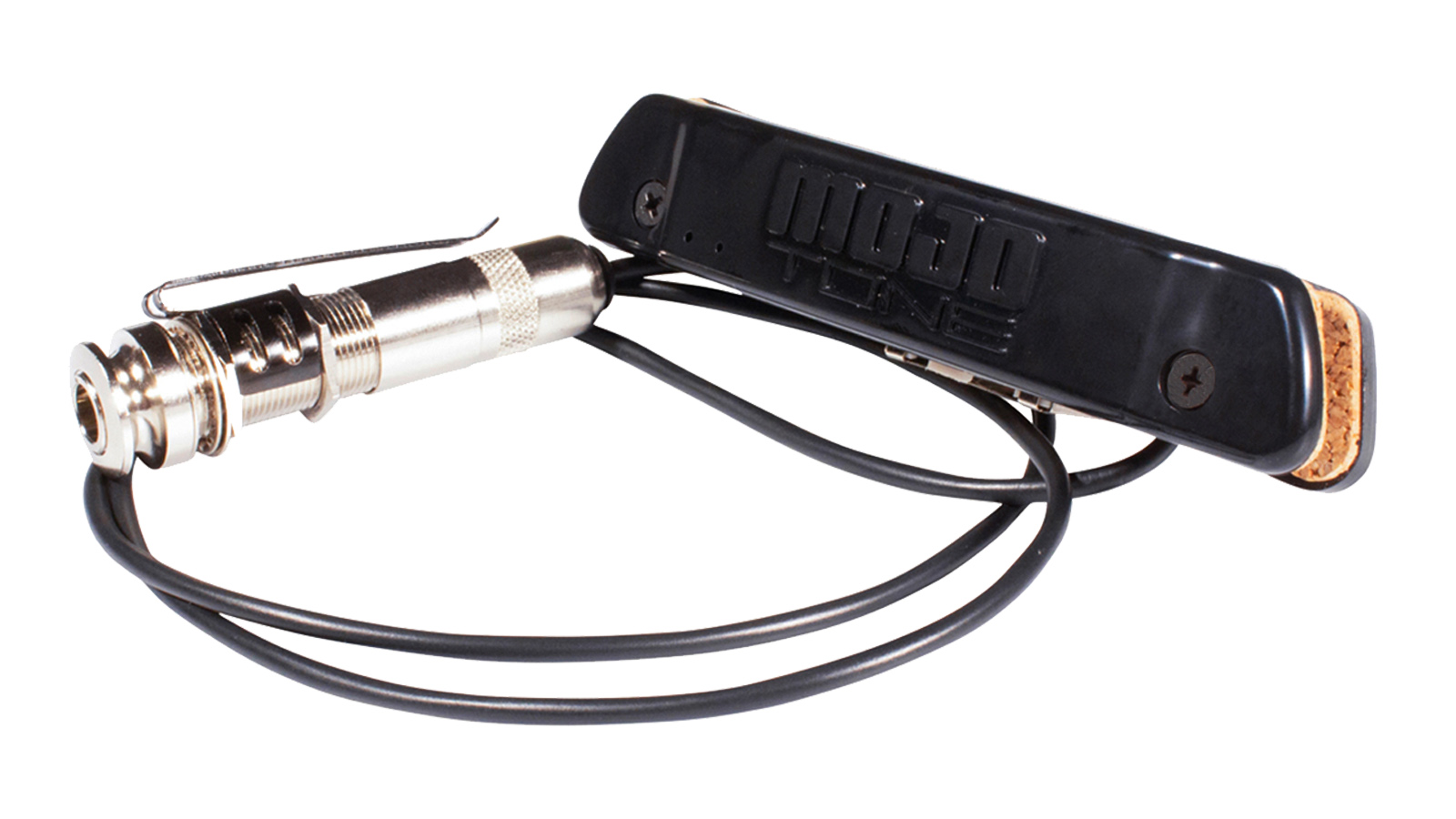
3. Mojotone Quiet Coil NC-1
Our expert review:
Specifications
Reasons to buy
Reasons to avoid
Mojotone’s Quiet Coil NC-1 is a fantastic option for anyone who’s sick of acoustic pickups changing the personality of their instrument. Mojotone has apparently “solved the soundhole pickup problem”, and we think they’ve got quite a persuasive argument.
The Quiet Coil NC-1 is, as the name suggests, noise canceling. It’s got a 6V active preamp that supplies the necessary power to suppress any extra noise and feedback, so it’s great for live work as well as for use in the studio. The two CR2032 batteries have up to 1,000 hours of life in them and with two bright LED indicator lights, you’ll never get caught off guard with a dead battery.
The NC-1 is specifically voiced and EQ’d like a microphone to emphasize your guitar’s pure, natural acoustic tone. It’s also designed to have perfect string balance and volume with bronze or phosphor bronze strings, hence the lack of adjustable polepieces, or the need for specific NC-1-friendly strings. It’s lightweight and compact too, so your picking hand can carry on doing its thing without worry. Unfortunately, the NC-1 is currently only available in the US, but is still a fantastic option for anyone who wants an extra special acoustic pickup.
Best humbucker
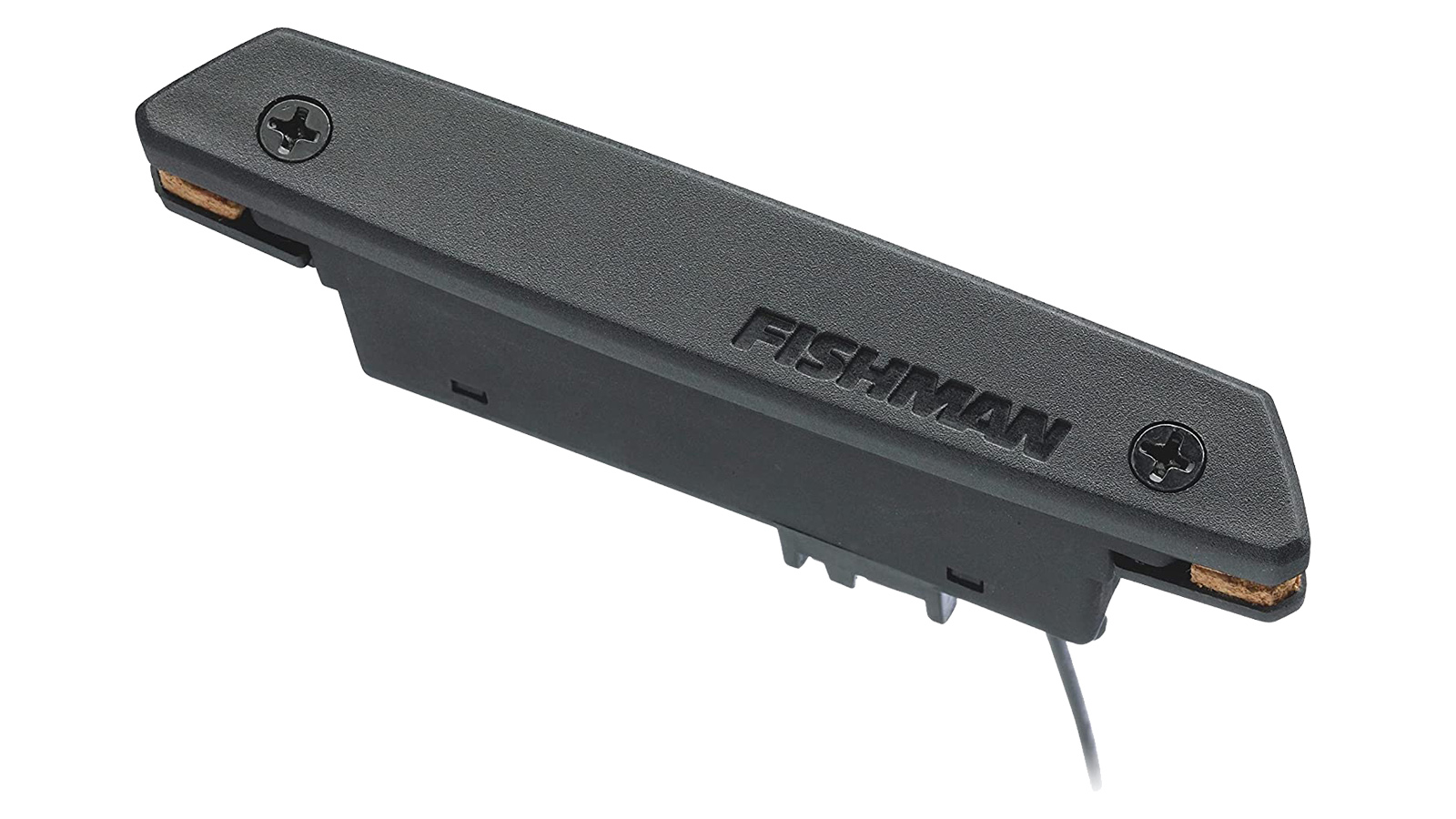
5. Fishman Rare Earth Humbucker
Our expert review:
Specifications
Reasons to buy
Reasons to avoid
Fishman’s Rare Earth soundhole pickup has been an industry stalwart for a long while, and in its many forms has helped open up a world of opportunity to many acoustic players all across the globe.
This latest iteration of the Rare Earth humbucker has been re-voiced and re-tuned to deliver a delectably smooth treble response - something that many acoustic pickups struggle to achieve. An active humbucker equipped with a neodymium magnet, the Rare Earth offers incredible string balance and sparkling clarity, without sacrificing the natural warmth and depth of your acoustic tone.
Preamp-wise, the Rare Earth is basic - but if it ain’t broke, don’t fix it. The low-current design of the preamp is actually one of its biggest strengths, allowing up to 240 hours of battery life. Along with easy installation thanks to the redesigned mounting system, the Rare Earth is great for anyone who wants the reassurance of an industry-leading brand on their pickup.
Best output
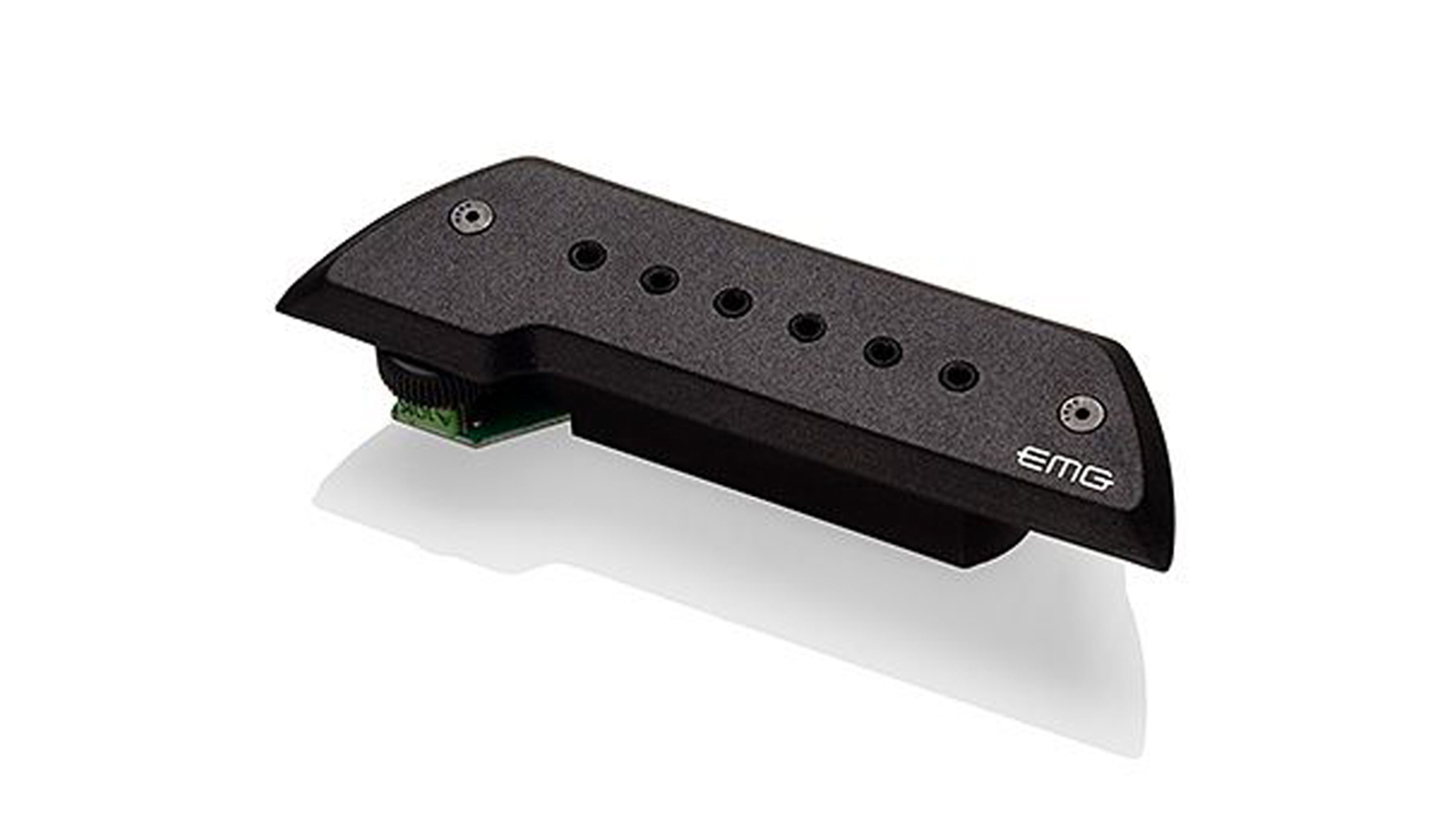
6. EMG ACS Acoustic Guitar Pickup
Our expert review:
Specifications
Reasons to buy
Reasons to avoid
This hugely impressive active EMG acoustic pickup is quintessentially EMG in its build in the sense that it uses the Quik-Connect system for fast installation. Step away from the toolbox; there’ll be no soldering, no rerouting required here.
Like its electronic siblings, which revolutionized electric guitar design by making active humbuckers a mainstream feature, the EMG ACS has a high-output performance that’s hum-free.
And yet consider the ACS. It has adjustable pole pieces so you can adjust its output to match your instrument and playing style. Its active preamp is tuned especially for acoustic guitars. The only slight detractor is the battery life, you’ll get around 12 hours of play from fully charged batteries. If you’re gigging, make sure you have spares on hand in your gigbag.
More options...
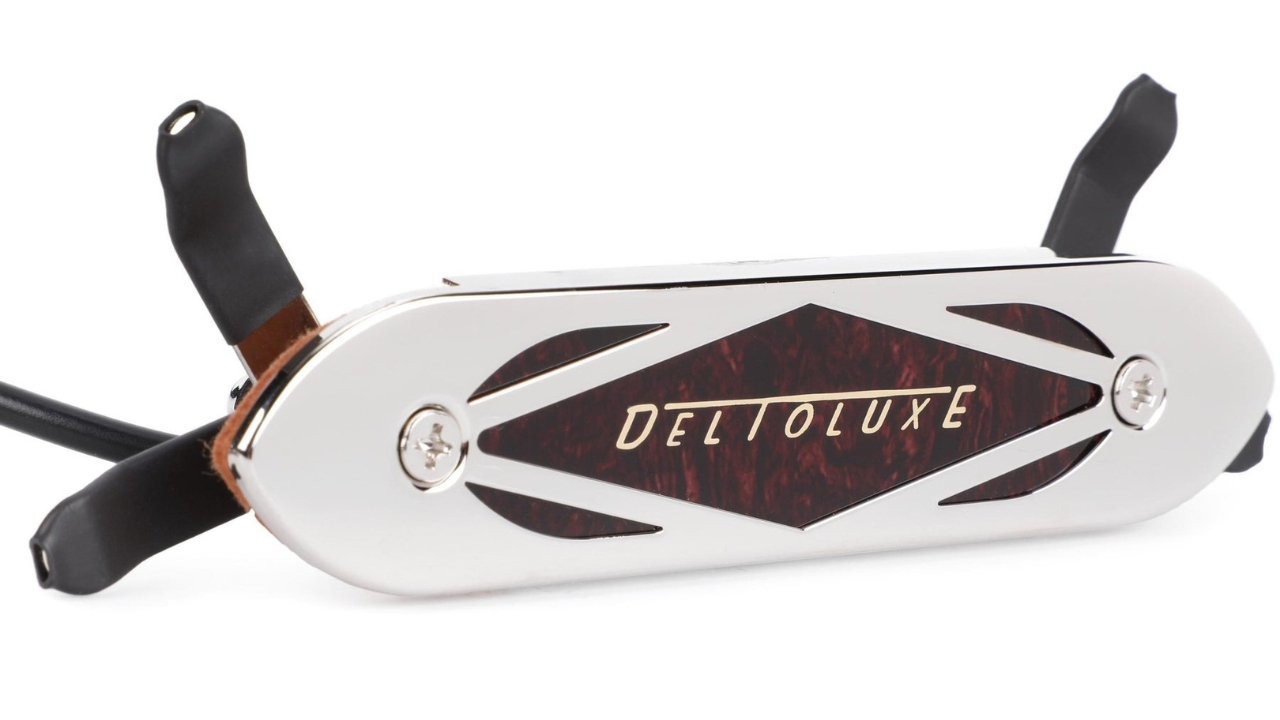
7. Gretsch Deltoluxe
Our expert review:
Specifications
Reasons to buy
Reasons to avoid
Taking inspiration from the DeArmond Rhythm Chief 1000, Gretsch has introduced the Deltoluxe, an affordable, retro-looking acoustic soundhole pickup. Being a soundhole pickup, it will be front and center, so it’s a relief that it exudes mid-’50s sophistication and will make any parlor guitar pop.
If you’re considering electrifying your parlor, the Deltoluxe is a fantastic pairing. The Alnico 5 magnet complements bluesy tones, especially when plugging into an 8-inch combo amp. There’s a surprising amount of attack for a passive pickup, and the prominent bass response adds a real depth often lacking in passive pickups.
You don’t need to be a luthier to fit the Deltoluxe, or the ‘money stick’ as it’s known, thanks to non-permanent attachments that can be tightened to grip the guitar’s surface. It’s also pre-wired to the endpin jack, so no soldering is required. Of course, being a passive pickup primarily designed for fingerpicking blues, it isn’t the most versatile option. However, if that’s your style, there’s no need to look any further.
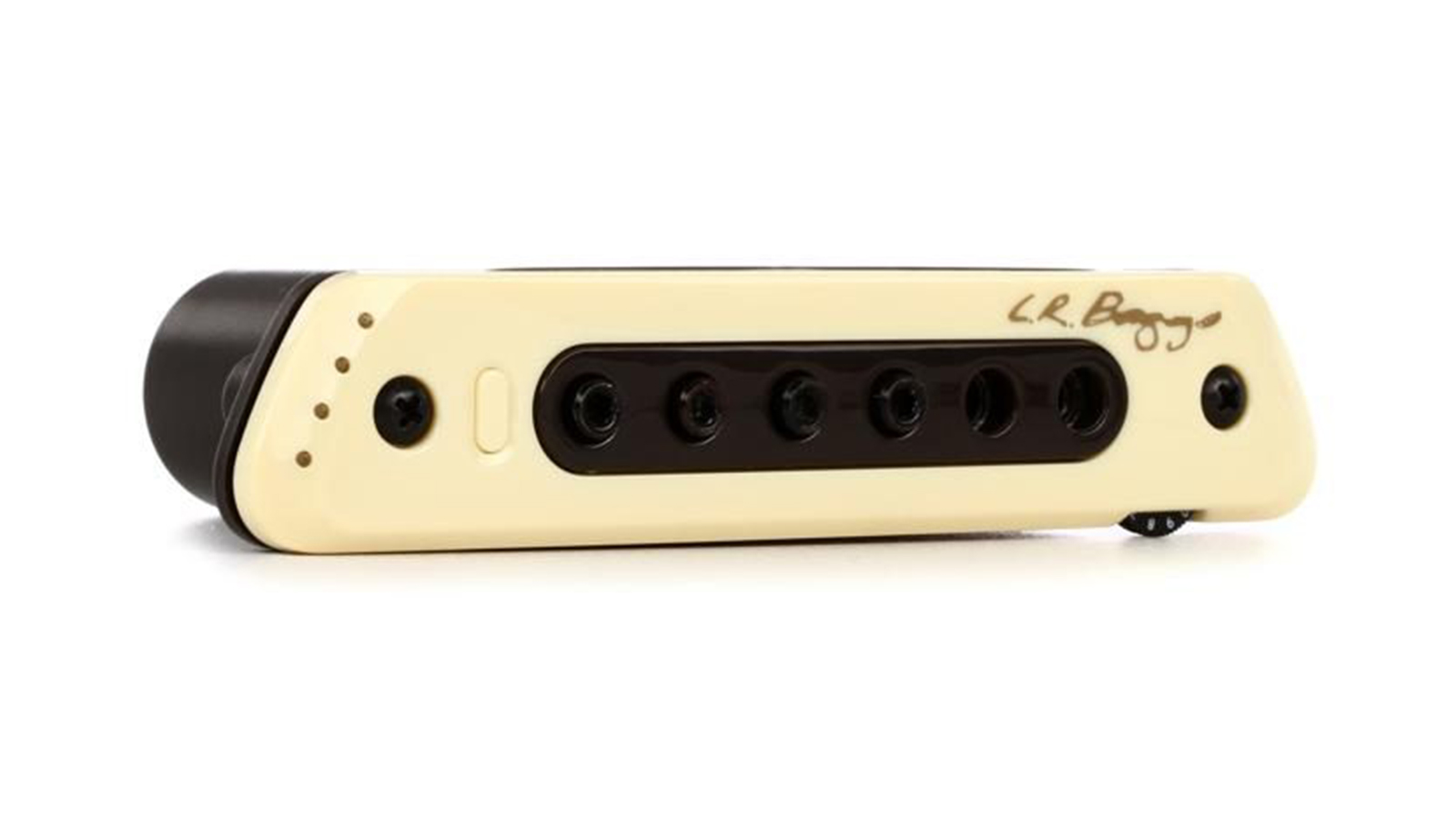
8. LR Baggs M80 Acoustic Guitar Pickup
Our expert review:
Specifications
Reasons to buy
Reasons to avoid
Another LR Baggs pickup, another naturalistic sound performance. If the platonic ideal of an acoustic guitar pickup is to translate the voice of your guitar faithfully so it may be amplified, this is as close as it gets. The M80 is also super-versatile, with features that make it a pro-quality choice for stage or studio.
There are switchable active and passive modes. Use the active mode for a little contouring on your EQ. There is a battery check mode but if you are caught short you can switch it to passive mode and continue the show.
But the real genius is in a design that preserves your acoustic's voice by using a free-floating second pickup coil as a 3D body sensor, with the other coil bringing out all the frequency response and dynamics of the string movement.
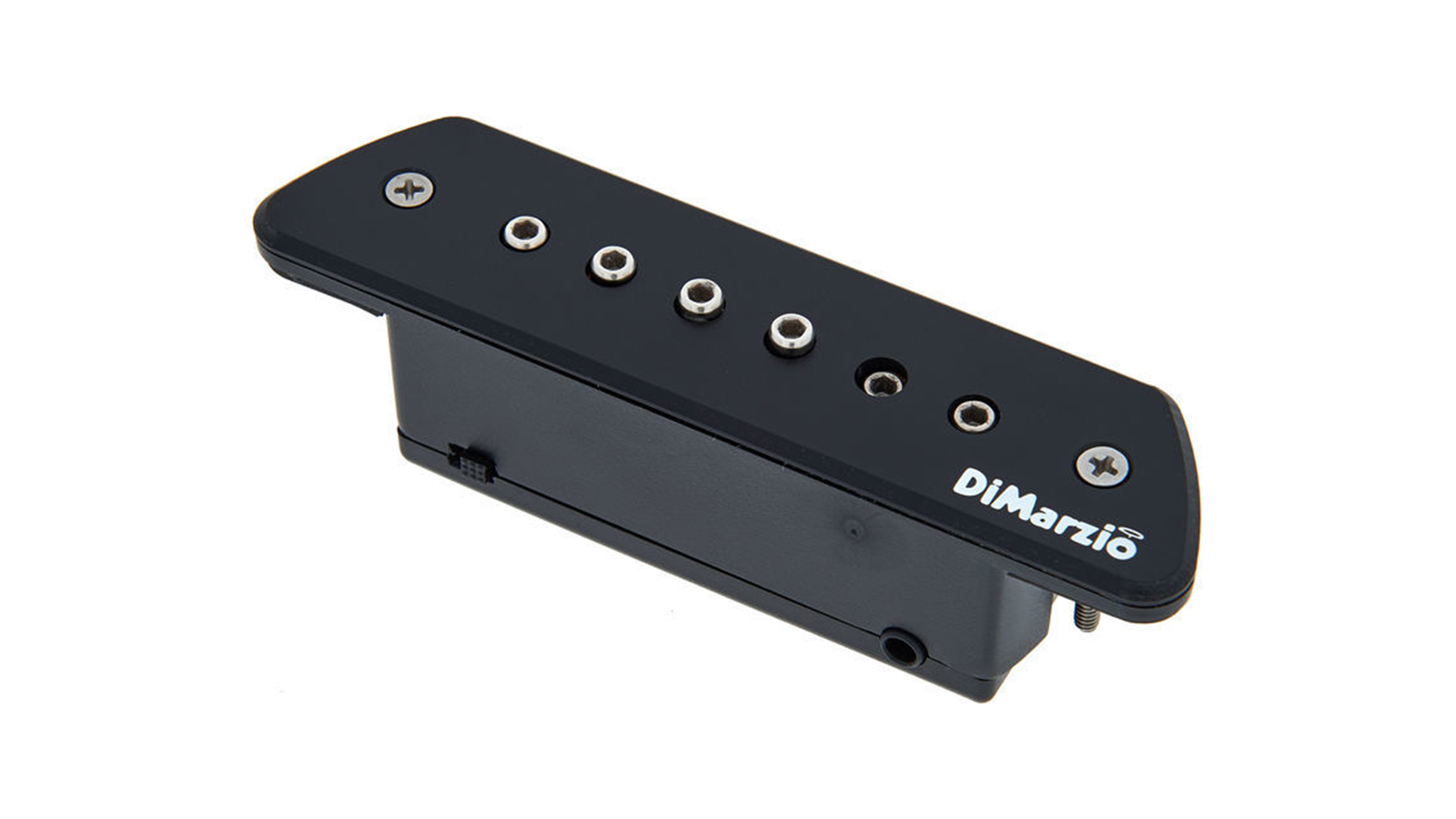
9. DiMarzio The Black Angel
Our expert review:
Specifications
Reasons to buy
Reasons to avoid
There is a lot to like about the Black Angel. It is a simple and non-invasive set-up, easily mounted in the soundhole. The build features two coils with a rare earth magnetic core, each sitting on a parallel axis to the strings, with an acoustically isolated magnetic circuit to reduce finger squeak.
Don’t let the fact the Black Angel is magnetic put you off – it is quiet, and it takes effects well. Best of all, there is a phase switch that enables you to combine it with multiple sources without issues. Those looking for something to complement their piezos or transducer will love it. Otherwise it is an excellent, if pricey, passive pickup.
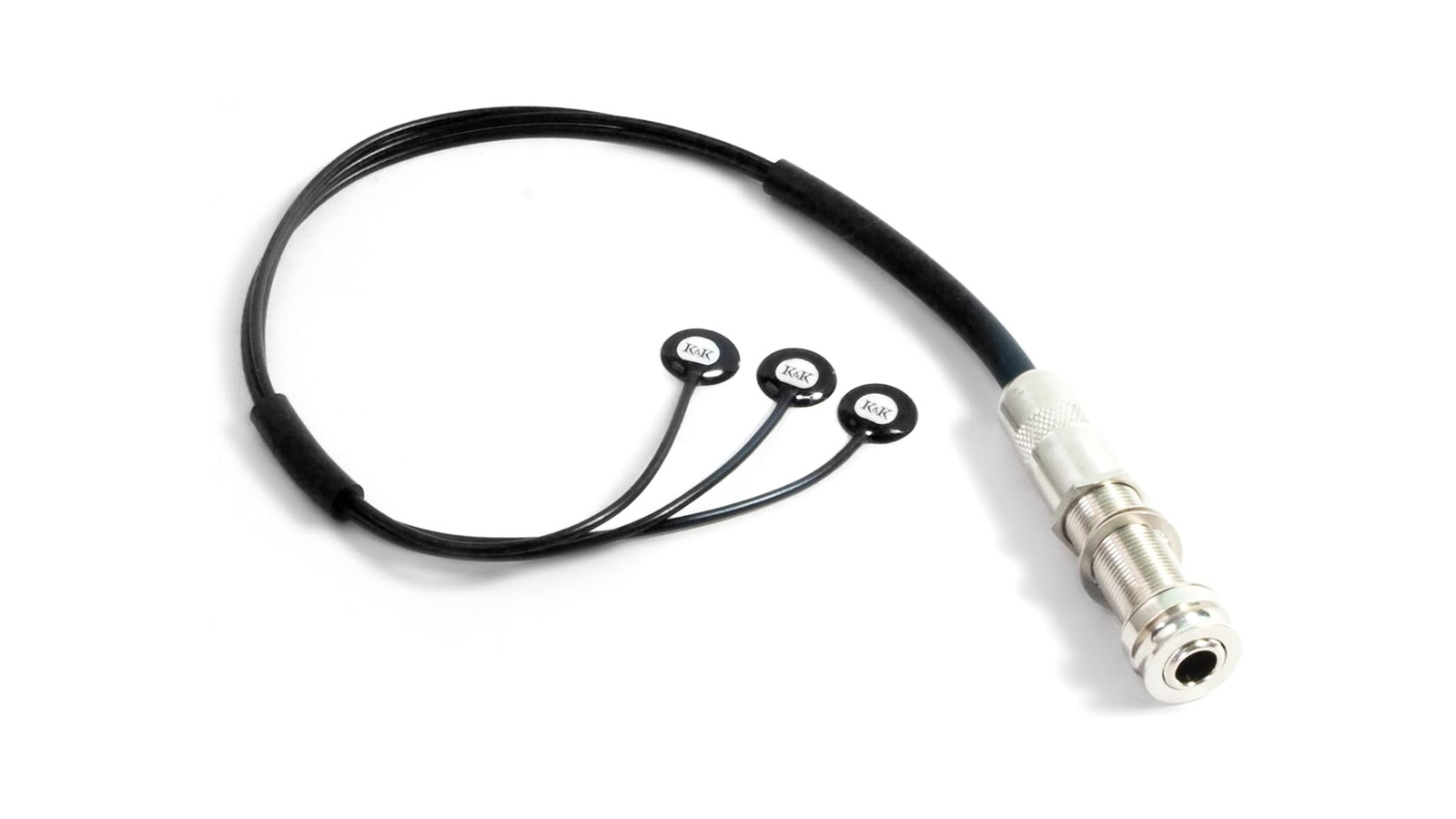
10. K&K Sound Pure Mini
Our expert review:
Specifications
Reasons to buy
Reasons to avoid
K&K’s flagship acoustic guitar pickup is universally lauded for good reason. First off, it’s cheap. For an extra 100 bucks you can get a preamp with a three-band EQ that you can attach to your belt loop.
All this and you haven’t even modified your instrument. If you have a steel-string you feel is too precious for surgery but you want a pickup, this makes a good option to consider alongside the less-invasive soundhole pickups.
With three sensors that are superglued to the underside of your bridge played, the Sound Pure Mini delivers a naturalistic and warm, full tone – and the positioning of those sensors helps cut down on any feedback.
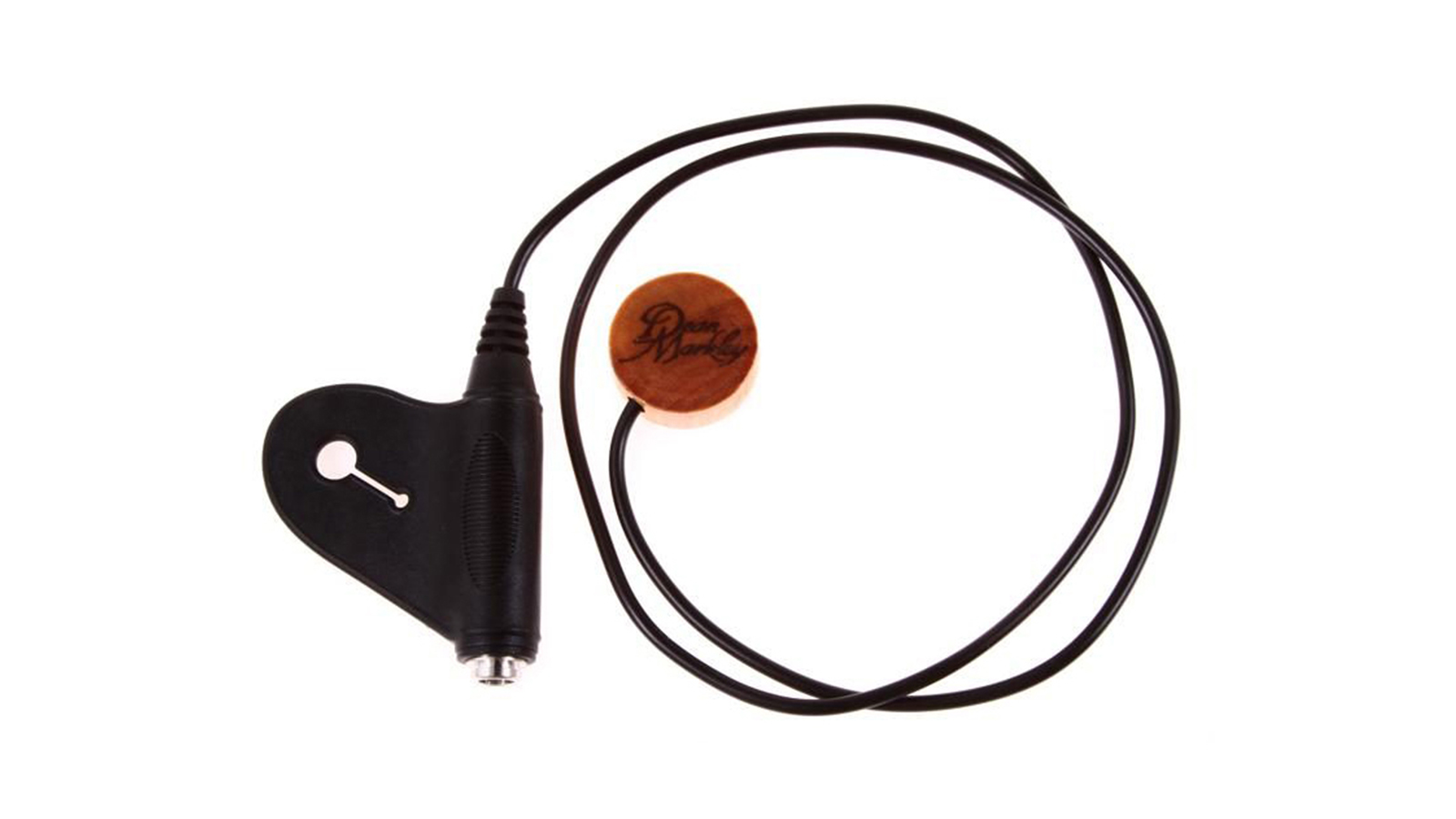
11. Dean Markley XM Artist
Our expert review:
Specifications
Reasons to buy
Reasons to avoid
While the XM Artist transducer isn't going to compete with the premium LR Baggs or Fishman units in this best acoustic guitar pickups guide, it's worth mentioning in dispatches for its ease of use, solid performance and utterly unbeatable price.
Not everyone is going to need a pro-quality piezo, and this is easily mounted and as cheap as chips. You might take a few goes trying to find the sweet spot on your guitar, but the adhesive won’t damage your finish so you can experiment freely. If you’re only playing the odd open mic night, or need a backup, this is a more than respectable, wallet-friendly choice.
FAQs
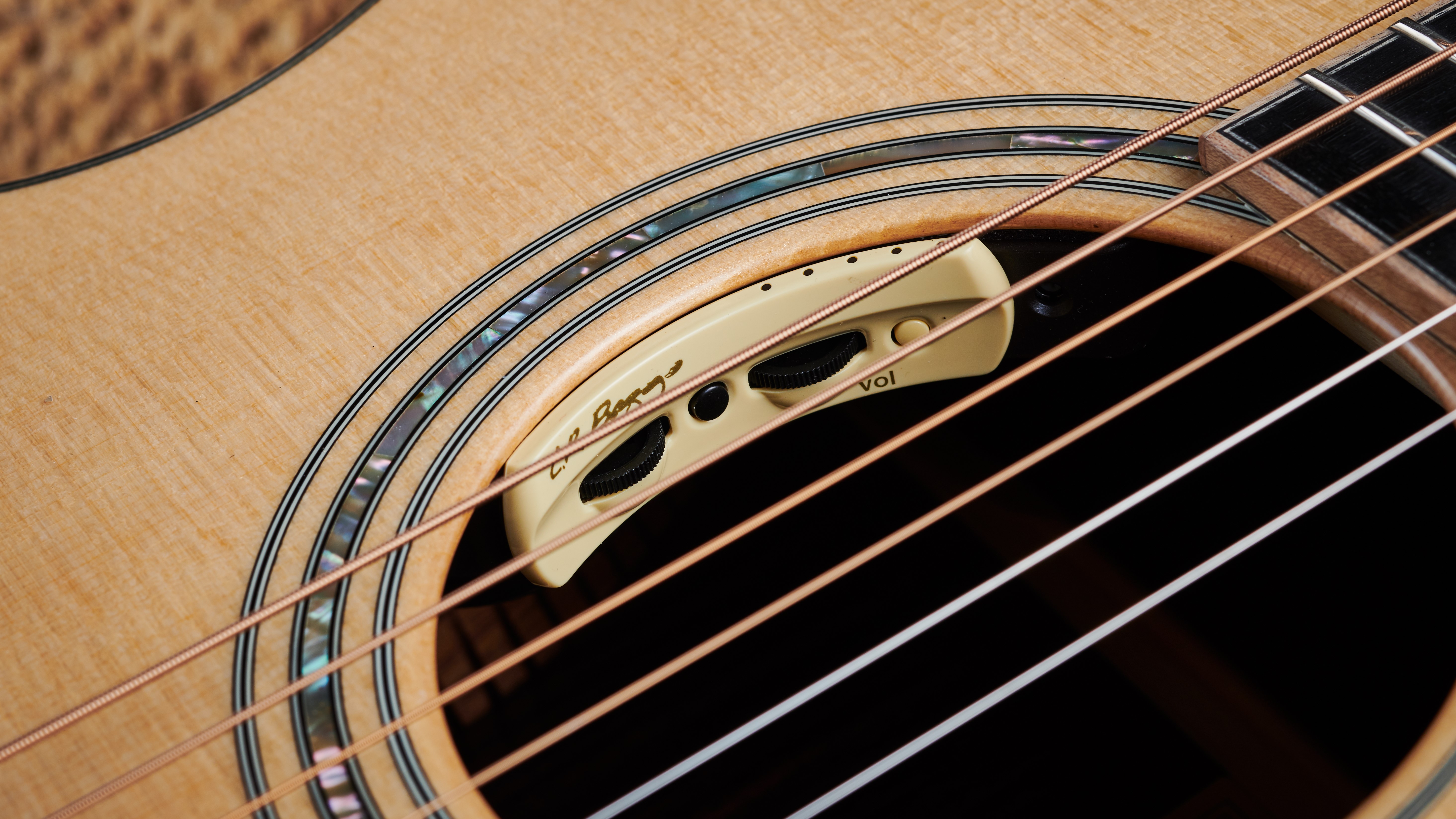
What is an acoustic guitar pickup and how does it work?
Acoustic guitar pickups come in many different forms and the way they work is to amplify the sound of your instrument when plugging it into a PA or acoustic guitar amp. Musicians that are playing acoustic live will need an acoustic guitar pickup to ensure they’re heard above the crowd and can match other instrument volume levels in a full band scenario. Acoustic guitar pickups can also have a use when recording, as they can capture the sound of the inside of the instrument, and can also be used alongside pedalboards to add effects.
What are the different types of acoustic guitar pickups?
There are three main types of acoustic guitar pickup you’ll come across, each with its own advantages and disadvantages.
Piezo pickups are the most common type, often found installed as standard on electro-acoustic guitars. A piezo pickup detects the vibration of the guitar strings and is usually mounted underneath the saddle of the guitar. Known for its bright, almost brittle sound, piezo pickups are popular because of their impressive rejection of feedback and their ability to be used on classical guitars without steel strings.
Soundhole pickups or magnetic pickups are very similar to electric guitar pickups in their design. They work via magnetism and are usually placed across the soundhole of your acoustic guitar in order to pick up the vibrations of your acoustic guitar strings. They’re really easy to install, making them a great way to convert a standard acoustic to an electro-acoustic, and their tone is similar to a single coil pickup, sparkly and warm with plenty of articulation. They still don’t quite capture the full tonality of your instrument and are prone to feedback at high volumes too.
Microphone pickups are designed to pick up the internal resonances of your acoustic guitar body. Working similarly to a regular microphone, they provide the most realistic depiction of your acoustic guitar's unplugged tone. They usually come paired with a preamp and a piezo or magnetic pickup as on their own they’re not particularly loud. Like soundhole pickups, they’re also prone to feedback.
Which type of acoustic guitar pickup is best for me?
It all depends on what you want from your instrument. If you’ve got a purely acoustic guitar and want to make it an electro-acoustic, then a piezo or soundhole pickup would probably be best for you. Soundhole pickups are easier to install, but piezo pickups are cheaper and have the advantage of working on nylon string guitars as well.
If you’re not happy with the existing piezo pickup, then a microphone or soundhole pickup might be more to your liking. You can even wire them up to use both at the same time, adjusting your tone to your liking by blending both sounds.
If you have a premium instrument that you want to capture that gorgeous natural tone of, then a microphone pickup will best translate your tone authentically. Bear in mind you’ll need to use it with a preamp, and perhaps even a piezo or soundhole pickup to get the right volume level to play live, however.
Can I install an acoustic guitar pickup on my guitar myself?
When installing an acoustic guitar pickup, it all depends on the type. Undoubtedly the easiest to install is the soundhole pickup which just requires a screwdriver. It’s up to you whether you want to drill a hole in the body to feed the input through, or you can just run it over the exterior of the body itself if you don’t want to risk damaging your acoustic.
Piezo pickups require a lot more work to install because you have to place them underneath the guitar bridge on the inside of the body. Piezo pickups can be quite fragile so you have to be careful when sticking them to the body, as bending can result in them being broken. You’ll need glue, putty, or tape to mount it to the underside of the bridge, taking off the strings and feeding it through the soundhole.
It’s a similar story with microphone pickups, as you’ll need to place it inside the guitar body. One of the other issues with microphone pickup installation is finding the sweet spot where it captures the sound of your guitar best. You’ll need to experiment with different placements to find the best sound for you, which can extend the installation time.
Will installing a pickup affect the sound of my guitar?
If it is installed correctly, then it will have no effect on the sound - nor the value - of your acoustic guitar. Acoustic guitar pickups are designed not to affect the natural tone of your instrument, and many of them are lightweight or in the case of soundhole pickups, easily removable.
Do I need a preamp for my acoustic guitar pickup?
A preamp is essential for boosting the volume of an acoustic guitar pickup to usable levels. Most pickups come with a preamp already bundled into it, so you’ll often see controls for volume as well as sometimes tone on these preamp units. Other times there will just be an additional unit with no controls that pickup that requires mounting.
Find out more about how we make our recommendations and how we test each of the products in our buyer's guides.
How we test
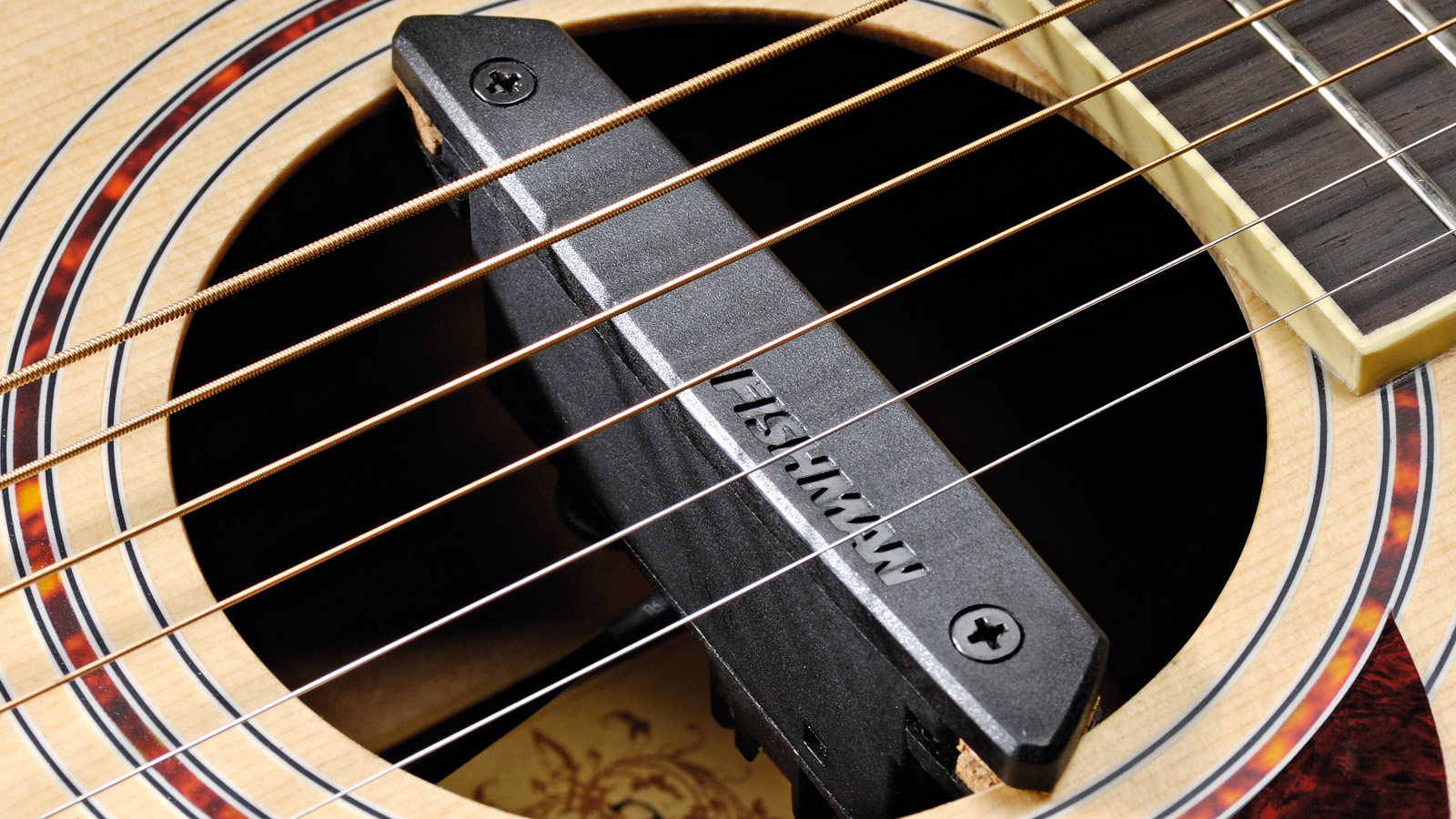
When testing an acoustic guitar pickup we'll subject it to the same rigorous process as any kind of guitar pickup, whether testing an external one or something already part of a guitar. With acoustic guitar pickups we're looking for something that accurately translates the unplugged sound of the acoustic through a PA system or acoustic guitar amp.
Our first port of call when testing is to examine the installation process. Acoustic guitar pickups are typically installed inside the body, which can make getting them in difficult. Some are mounted like traditional electric guitar pickups which can often makes thing easier, but most will require adhering to the inside of the guitar body.
Determining the ease of use when installing allows us to decide if a pickup is beginner friendly, or if it'll require an experienced guitar tech to install. It also allows us to examine the build quality detail, ensuring each wire has been soldered carefully, and the whole thing put together in a way that will last.
Once we've passed this step, we'll then focus on the sound of the pickup in question. We want to hear our acoustic guitars natural voice resonating through our amp or PA, which is the chief task of any acoustic guitar pickup. We'll compare the plugged in and unplugged sound, and sometimes record the signal so we can listen back in isolation and see how the pickup highlights the acoustic guitar's tone.
Ideally we'll take a good couple of weeks with the acoustic guitar pickup we're testing. This allows us to get past the honeymoon period and really dig into how the pickup reacts in different situations, whether that's recording at home with an audio interface or gigging through a PA system.
Read more about our rating system, how we choose the gear we feature, and exactly how we test each product.
Related buyer's guides
You can trust Guitar World
- We round-up the best acoustic guitars under $1,000, as well as...
- ...the best acoustic guitars for beginners
- Take a look at the best acoustic electric guitars money can buy
- Transform your playing with the best guitar capos for acoustic and electric
- Plug it in with the best guitar cables
- Bag the perfect tone for less, with the best guitar amps under $1,000
All the latest guitar news, interviews, lessons, reviews, deals and more, direct to your inbox!
Jonathan Horsley has been writing about guitars since 2005, playing them since 1990, and regularly contributes to publications including Guitar World, MusicRadar and Total Guitar. He uses Jazz III nylon picks, 10s during the week, 9s at the weekend, and shamefully still struggles with rhythm figure one of Van Halen’s Panama.
- Ross Holder
- Matt McCrackenJunior Deals Writer

